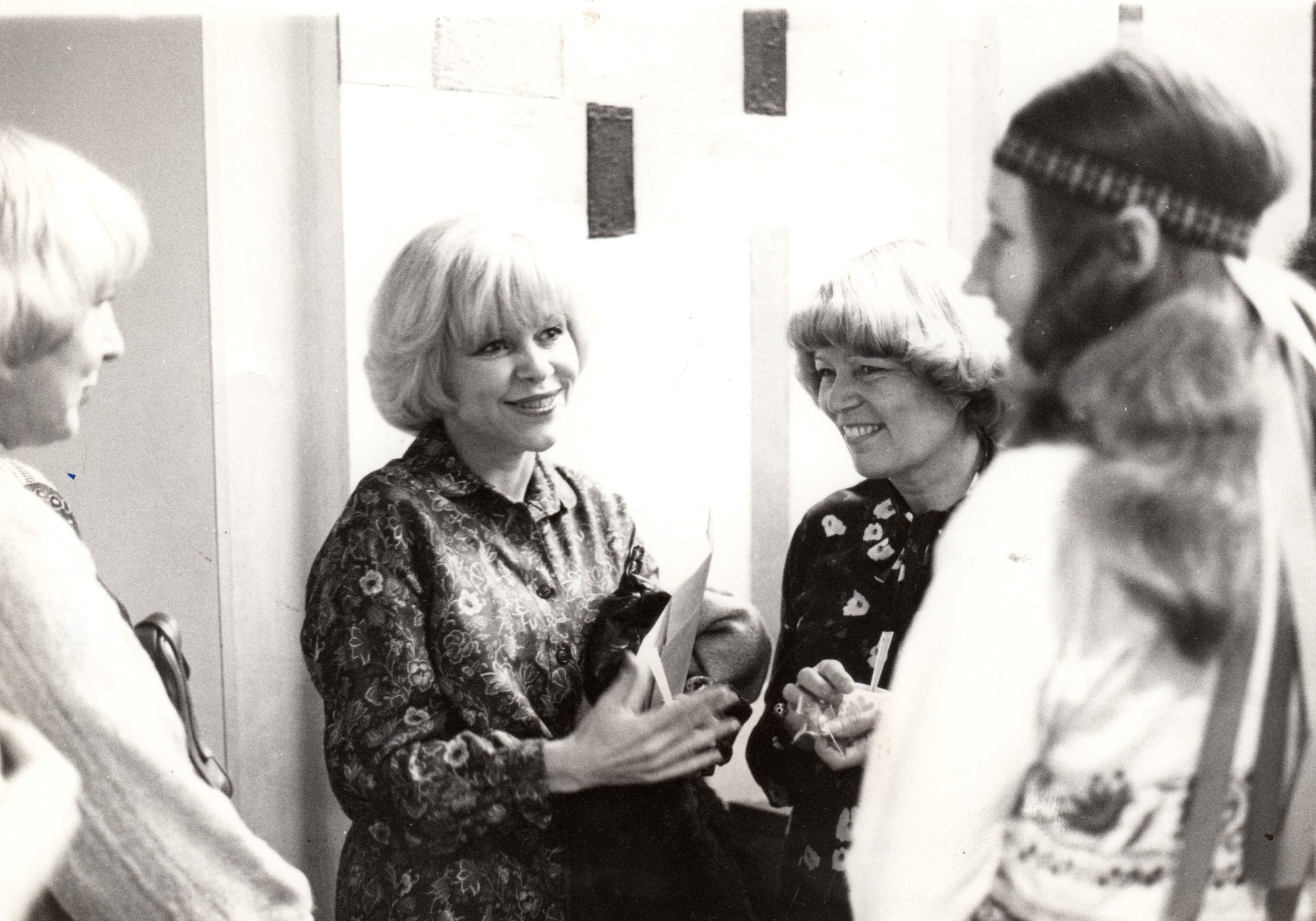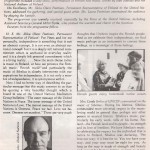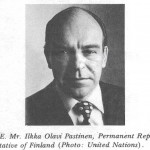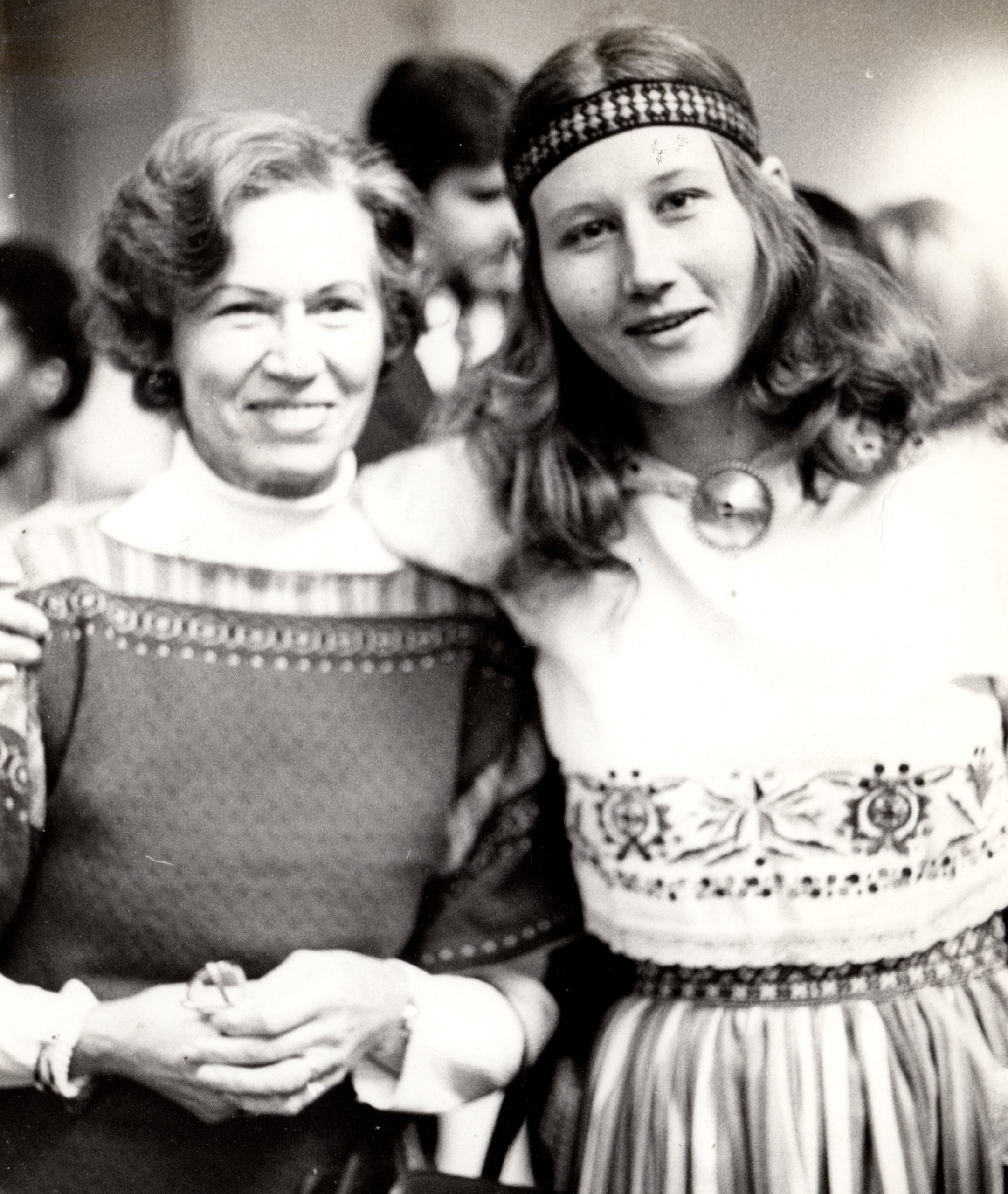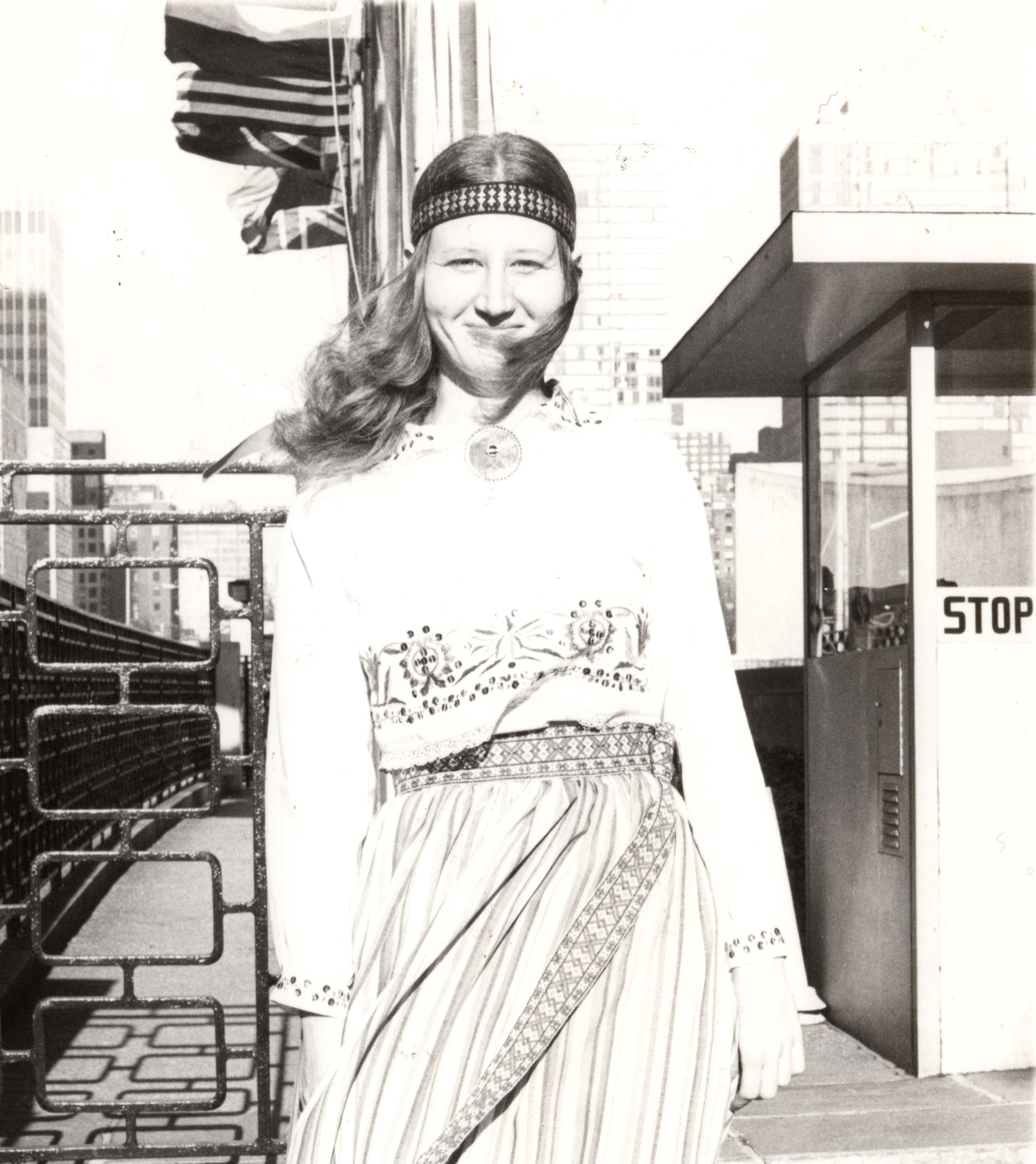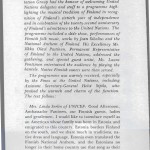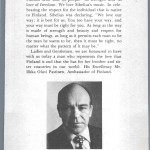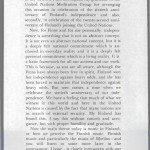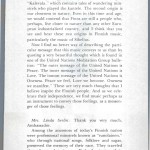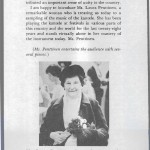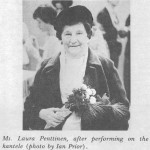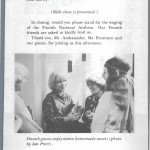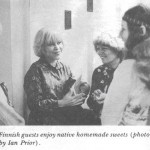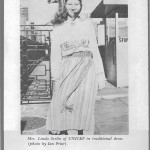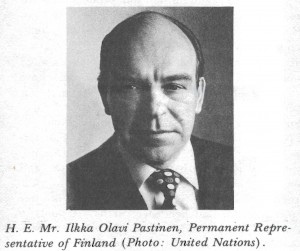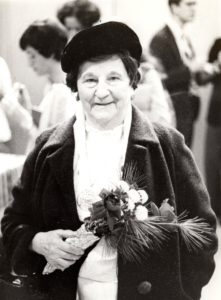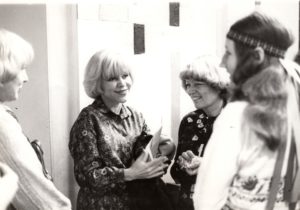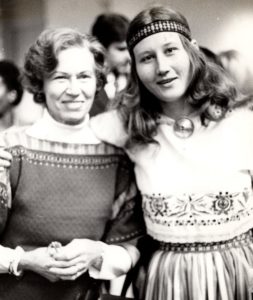Finland: Champion of Independence -Music Tradition Celebrate UN Anniversary 15 Dec 1977
Filed under europe | UN AnniversariesOn 15 December 1977 the Meditation Group at the United Nations sponsored a programme highlighting the musical tradition of Finland, in recognition of Finland’s sixtieth year of independence and in celebration of the twenty-second anniversary of Finland ‘s admittance to the United Nations. The programme included a slide show, performances of Finnish folk music, works by Jean Sibelius and the National Anthem of Finland.
His Excellency Mr. llkka Olavi Pastinen, Permanent Representative of Finland to the United Nations , addressed the gathering , and special guest artist, Ms. Laura Penttinen entertained the audience by playing the kantele.
The programme was warmly received, especially by the Finns at the United Nations, including Assistant Secretary-General Helvi Sipila, who praised the warmth and charm of the function.
Excerpts from the programme folow .
* * * * * * * * * * * * * * * * * * * * *
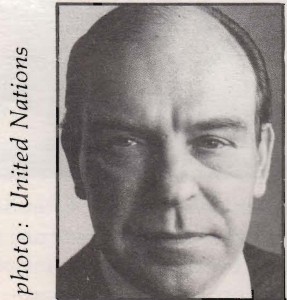 H. E. Mr. llkka Olavi Pastinen, Permanent Representative of Finland: For Finns and for me personally, independence is something that is not an abstract concept. It is not even an abstract national concept, but it is a deeply felt national commitment which is anchored in everyday reality and it is a deeply felt personal commitment which is a living reality .. .. Now the main theme today is music in Finland, or how we perceive the Finnish music. Finnish music and particularly the music of Sibelius is closely interwoven with our aspirations for independence. It is not only a symbol of independence; it is synonymous wi th it. . . .
H. E. Mr. llkka Olavi Pastinen, Permanent Representative of Finland: For Finns and for me personally, independence is something that is not an abstract concept. It is not even an abstract national concept, but it is a deeply felt national commitment which is anchored in everyday reality and it is a deeply felt personal commitment which is a living reality .. .. Now the main theme today is music in Finland, or how we perceive the Finnish music. Finnish music and particularly the music of Sibelius is closely interwoven with our aspirations for independence. It is not only a symbol of independence; it is synonymous wi th it. . . .
Now I find no better way of describing the particular message that this music conveys to us than by quoting a very beautiful thought which is found in one of the Meditation Group bulletins: ” ‘The outer message of the United Nations is Peace. The inner message of the United Nations is Love. The inmost message of the United Nations is Oneness. Peace we feel. Love we become. Oneness we manifest..[*1] ” These are very much thoughts that I believe inspire the Finnish people. And as we celebrate their independence, we find music perhaps as an instrument to convey those feelings, as a messenger of those feelings.
* * * * * * * * * * * * * * * * * * * * *
Finnish guests enjoy homemade native sweets .
* * * * * * * * * * * * * * * * * * * * *
Mrs. Linda Serlin of UNICEF commented on the music of Sibelius: During his lifetime, Sibelius commanded more universal respect in the music loving world in general than perhaps any other person in musical history. Sibelius’s music, particularly his early work, tells of his home, Finland – the Finnish land and its people-its strength and its love of freedom. We love Sibelius’s music.
 In celebrating the respect for the individual that is native to Finland, Sibelius was declaring, “We love our way; it is best for us. You too have your way, and your way must be right for you. As long as the way is made of strength and beauty and respect for human beings, as long as it permits each man to be the man he wants to be, then it must be right, no matter what the pattern of it may be .”
In celebrating the respect for the individual that is native to Finland, Sibelius was declaring, “We love our way; it is best for us. You too have your way, and your way must be right for you. As long as the way is made of strength and beauty and respect for human beings, as long as it permits each man to be the man he wants to be, then it must be right, no matter what the pattern of it may be .”
* * * * * * * * * * * * * * * * * * * * *
Notes:
[*1] excerpt from talk “The Inner Message Of The United Nations “, by Sri Chinmoy in Dag Hammarskjold Auditorium on o4 Jan 1973. Talk appears in, The Tears Of Nation-Hearts, Agni Press, 1974.
Page Image from 1977 Report:
Photos:
- bu-scpmaun-1977-12-27-vol-05-n-12-dec_Page_57-amb-pastinen-finland
- 1977-12dec-17-Finland-guests-after-2
- 1977-12dec-17-Finland-guests-after
- 1977-12dec-17-Finland-Guest-3
Details as appeared in Dec 1977 Bulletin:
- bu-scpmaun-1977-12-27-vol-05-n-12-dec_Page_56.
- bu-scpmaun-1977-12-27-vol-05-n-12-dec_Page_57.jpg
- bu-scpmaun-1977-12-27-vol-05-n-12-dec_Page_57-amb-pastinen-finland
- bu-scpmaun-1977-12-27-vol-05-n-12-dec_Page_58
- bu-scpmaun-1977-12-27-vol-05-n-12-dec_Page_60
- bu-scpmaun-1977-12-27-vol-05-n-12-dec_Page_61
- bu-scpmaun-1977-12-27-vol-05-n-12-dec_Page_62-traditional-dress.
More from the full Programee which appears in the Dec 1977 Bulletin “Meditation at the United Nations”
FINLAND : CHAMPION OF INDEPENDENCE
On 15 December 1977 the United Nations Meditation Group had the honour of welcoming United Nations delegates and staff to a Programme high lighting the musical tradition of Finland in recognition of Finland’s sixtieth year of independence and in celebration of the twenty-second anniversary of Finland’s admittance to the United Nations. The Programme included a slide show, Performances of Finnish folk music, works by Jean Sibelius and the National Anthem of Finland. His Excellency Mr. Ilkka Olavi Pastinen, Permanent Representative of Finland to the United Nations, addressed the gathering, and special guest artist, Ms. Laura Penttznen entertained the audience by Playing the kantele. Native Finnish sweets were then served.
The Programme was warmly received, especially by the Finns at the United Nations, including Assistant Secretary-General Helvi Sipila, who Praised the warmth and charm of the function. The text follows:
Mrs. Linda Chndika Serlin of UNICEF:
Good Afternoon. Ambassador Pastinen, our Finnish guests, ladies and gentlemen, I would like to introduce myself as an American whose family was born in Estonia and emigrated to this country. Estonia borders Finland on the south, and we share much in traditions, native dress and language. Estonia even translated the Finnish National Anthem, and the Estonians no longer in their home country use that song as their own national anthem and song of freedom
We have been listening to ”En Saga,” Op. 9, by Jean Sibelius
During his lifetime, Sibelius commanded more universal respect in the music-loving world in general than perhaps any other person in musical history. Sibelius’s music, and in particular his early work, tells of his home, Finland the Finnish land and its people—its strength and its love of freedom. We love Sibelius’s music. In celebrating the respect for the individual that is native to Finland, Sibelius was declaring, “We love our way; it is best for us. You too have your way, and your way must be right for you. As long as the way is made of strength and beauty and respect for human beings, as long as it permits each man to be the man he wants to be, then it must be right, no matter what the pattern of it may be.”
Ladies and Gentlemen, we are honoured to have with us today a man who represents the love that Finland is and that she has for her brother and sister countries in our world: His Excellency Mr. Ilkka Olavi Pastinen, Ambassador of Finland.
Mr. Ilkka Olavi Pastinen, Permanent Representative of Finland (Photo: United Nations) .
Mr. Ilkka Olavi Pastinen, Permanent Representative of Finland:
Ladies and gentlemen, friends, let me say first of all that I would be remiss in my duties if I did not express my gratitude to the United Nations Meditation Group for arranging this occasion in celebration of the sixtieth anniversary of Finland’s independence and also, secondly, in celebration of the twenty-second anniversary of Finland’s joining the United Nations.
Now, for Finns and for me personally, independence is something that is not an abstract concept. It is not even an abstract national concept, but it is a deeply felt national commitment which is anchored in everyday reality and it is a deeply felt personal commitment which is a living reality. It is a basic framework for all our actions and our work. This is because, as you are all aware, although the Finns have always been free in spirit, Finland won her independence against heavy odds, and she has been forced to maintain that independence against heavy odds. But now comes a time when we celebrate the sixtieth anniversary of our independence, We have a feeling that much of what we witness in this world and here in the United Nations is caused by the fact that many nations are in search of external security. My Finland has found this. I say this without conceit and arrogance, but with proper humility and gratitude.
Now the main theme today is music in Finland, or how we perceive the Finnish music. Finnish music and particularly the music of Sibelius—and you will listen to some more later in the programme, I hope—is closely interwoven with our aspirations for independence. It is not only a symbol of independence; it is synonymous with it. The Finnish music and the music of Sibelius have sustained us in difficult times as well as in moments of joy. If you would ask me what the origin of Sibelius’s music and most of Finnish music is, I would give very much a layman’s answer that, in my own view the music has two main origins. The Finnish mythology describes it in the national epic, Kalevala, which contains tales of wandering minstrels who played the kantele. The second origin is our closeness to nature. Even m this time and age, we would contend that- Finns are still a people who, perhaps, live closer to nature than any other European industrialized country, and I think that you see and hear these two origins in Finnish music, particularly the music of Sibelius
Now I find no better way of describing the particular message that this music conveys to us than by quoting a very beautiful thought which is found in one of the Meditation Group at the UN bulletins: “The outer message of the United Nations is Peace. The inner message of the United Nations is Love. The inmost message of the United Nations is Oneness. Peace we feel. Love we become. Oneness we manifest. ”
These are very much thoughts that I believe inspire the Finnish people. And as we celebrate their independence, we find music perhaps as an instrument to convey those feelings, as a messenger of those feelings.
Mrs. Linda Chandika Serl.in: Thank you very much, Ambassador.
Among the ancestors of today’s Finnish nation were professional minstrels known as “runolainen,’ who through national songs, folklore and sagas, preserved the memory of their race. They traveled throughout what is now Finland, singing their songs and playing the “kantele,” a primitive sort of harp. Their legends, wonder tales and proverbs were collected in 1835 by Dr. Elias Lonnrot and became the national epic, “Kalevala.” With its myths, wisdom, magic and rhythms, the poem contributed an important sense of unity to the country.
I am happy to introduce Ms. Laura Penttinen, a remarkable woman who is treating us today to a sampling of the music of the kantele. She has been playing the kantele at festivals in various parts of this country and the world for the last twenty-eight years and stands virtually alone in her mastery of the instrument today. Ms. Penttinen.
(Ms. Penttinen entertains the audience with several pieces. )
Ms. Laura Penttmen, after Performing on the kantele (photo
Thank you very much, Ms, Penttinen, Now we have a slide show of Finland. It will be accompanied, again, by Sibelius’s music, excerpts from his second symphony, which has come to be known as a musical portrayal of Finland’s struggle for po tical liberty.
(Slide show is Presented. )
In closing, would you please stand for the singing of the Finnish National Anthem. Our Finnish friends are asked to kindly lead us.
Thank you, Mr. Ambassador, Ms. Penttinen and our guests, for joining us this afternoon.
Finnish guests enjoy native homemade sweets
Mrs. Linda Chandika Serlin of UNICEF in traditional dress
